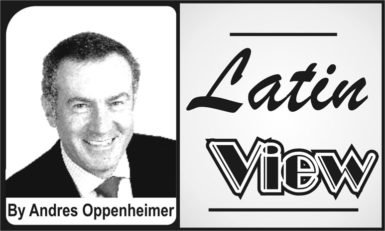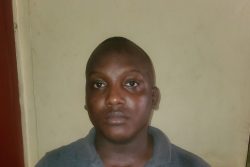 President Trump’s top aides have advised him not to shake hands with Cuban dictator Raúl Castro at the Summit of the Americas, which starts April 13 in Lima, Peru. But don’t bet that Trump will follow the script.
President Trump’s top aides have advised him not to shake hands with Cuban dictator Raúl Castro at the Summit of the Americas, which starts April 13 in Lima, Peru. But don’t bet that Trump will follow the script.
Organization of American States Secretary General Luis Almagro, one of the summit’s organizers, told me that an encounter between the two presidents will be “inevitable.” Trump and Castro will be in the same room several times during the 34-country summit, in which leaders from across the hemisphere will be meeting without aides and have several coffee breaks.
A senior administration official told McClatchy newspapers that Trump has been advised to avoid a handshake with Castro. White House officials don’t want a Trump-Castro picture to steal the show at the Summit, as the picture of former President Obama and Castro did at the previous summit three years ago.
U.S. officials fear that a Trump-Castro picture would send the wrong signal on U.S.-Cuba relations. Trump promised in a fiery speech to Cuban exiles in Miami last year to reverse Obama’s opening to Cuba. Trump has taken some minor steps in that direction, although he has not downgraded diplomatic relations or limited U.S. flights and cruises to the island.
In addition, Trump’s top aides don’t want a Trump-Castro picture to shift attention away from what they hope will be the focus of the summit: the crisis in Venezuela.This will be Trump’s first visit to Latin America and, perhaps, Castro’s last appearance on the world stage. The Cuban strongman, 86, has announced he will step down as president this month, although he will retain the powerful title of head of the ruling Communist Party.
It’s doubtful whether Trump will follow his advisers’ recommendation to not to come close to Castro. Just last month, when Trump talked on the phone with Russian President Vladimir Putin, the U.S. president ignored his national security advisers’ recommendation to not congratulate Putin for his victory in the sham March 18 Russian elections.
Trump had received a memo from his advisers stating, in capital letters, “DO NOT CONGRATULATE.” But that’s the first thing Trump did on the phone call — congratulate Putin for his “win.”
It is well known that Trump doesn’t read advisers’ memos or care what they say. This is, after all, the president who as a candidate who had never served in public office or in the military bragged that, “I know more than the generals.”
Plus, Trump, the ultimate showman, may not want to miss a photo op with Castro. In the absence of Venezuela’s dictator Nicolás Maduro — who has not been invited to the summit as a sign of protest against the sham elections that he plans to hold on May 20 — Castro will be, along with Trump, the main focus of media attention at the summit.
Of course, there is a chance that Trump will walk over to Castro, look down on him and admonish him for not having allowed a single free election or a free press in Cuba for almost 60 years.
I would applaud Trump for demanding a political opening in Cuba. The only problem is that Trump is the U.S. president with the least moral authority to preach democracy and human rights in recent memory. He has not only congratulated Putin for his electoral “victory” in Russia, but also embraced dictators in Turkey, Egypt, the Philippines and several other countries.
And after calling the U.S. press “the enemy of the people,” and launching near daily tirades against the media that report news that he doesn’t like, Trump will not be taken seriously if he berates Castro for not allowing press freedoms in Cuba.
That’s the problem with Trump’s departure from the post-World War II policy of standing up for democracy, human rights and free speech around the world: It diminishes his credibility when he criticizes Cuba or Venezuela. Whether he shakes hands with Castro or scolds him, Trump will pay a price for his unprincipled foreign policy.









